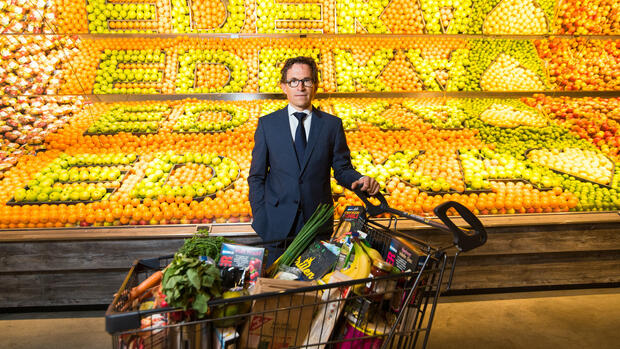Germany’s largest food retailer is tough in price negotiations with manufacturers.
(Photo: picture alliance/dpa)
Hamburg The dispute over price increases with the brand manufacturers has left its mark on the balance sheet of the retailer Edeka. “We lost operating profit because we were not willing to pass on the manufacturers’ price increases to the customers at this level,” said Edeka boss Markus Mosa.
The operating profit (EBIT) of Edeka and the regional companies of the cooperative shrank by 20 percent to 979.2 million euros in the past financial year, as the dealer announced when presenting the annual figures. This does not include the profits of the cooperative’s independent merchants. According to Mosa, this has also fallen by a good ten percent.
And the dispute with the brand manufacturers will not subside anytime soon. “The greed of international branded companies is not abating,” complained the Edeka boss. And it’s not just the Mars bars that are missing: According to him, 17 companies have completely or partially stopped delivering to Edeka.
Pampers will soon be scarce at Edeka
The dispute between Mars and Edeka, which culminated in a delivery stop, had recently caused a stir. But Procter & Gamble and Pepsi have also completely stopped supplying the market leader in the German food trade because they cannot agree on the purchasing conditions. Others, such as Henkel or Unilever, have stopped delivering at least part of the range.
And this situation will probably continue for some time. “It will be months rather than weeks before the customer finds Mars bars on our shelves again,” predicts Mosa. For other Mars Group products, such as Pampers diapers, there are likely to be bottlenecks in Edeka stores from June because the remaining stocks in the retailer’s warehouses are likely to be exhausted by then. Mars does not want to comment on the dispute with Edeka.
The manufacturers justify their higher price demands with increased costs. The dealers, however, consider a large part of the higher demands to be incomprehensible. “Through our own brands we have the transparency and know what is justified and what is not,” says the Edeka boss.
For example, detergent ingredients have become 30 percent cheaper over the past 12 months, says Mosa. In the case of its own brands, the retailer will pass on price reductions in raw materials to customers bit by bit. This also increases the pressure on the brand manufacturers. “We will see over the course of the year that prices for many products will fall or at least remain stable.”
The dealers get backing from a price study by Allianz Trade. According to this, excessive profit-taking by manufacturers contributes to high food price inflation. “We are observing that food manufacturers in particular are hungry for profits. They have increased prices much more than retailers,” explained Aurélien Duthoit, industry expert at Allianz Trade.
Own brands are increasingly replacing branded items at many retailers. This year, sales of Edeka’s own brands grew by 19.6 percent, while sales of branded goods fell by 2.1 percent.
Net sales increased the most
In this way, at least part of the delivery failures could be compensated. In the past financial year, the Edeka association increased sales by around 5.6 percent to 66.2 billion euros. This is well below the increase in food prices, which rose by an average of 13.4 percent last year compared to the previous year.
The approximately 3,500 self-employed merchants of the cooperative organization achieved around 36.5 billion euros in their shops, which is 5.2 percent more than in the previous year. In view of significantly rising prices and high inflation, the discounter Netto in particular has increased. According to the information, sales there increased by 7.6 percent to 15.8 billion euros.
>> Read also: Dispute between supermarket giant Edeka and Mars escalates
Edeka did not provide any information on the profits of the independent merchants. 395.7 million euros remained in the head office – 44.8 million more than in the previous year. The reason for the profit, which is above the forecast, is the increased gross profit at the discounter Netto and higher income from investments in associated companies.
According to the information, the number of grocery stores remained almost constant at just under 11,100. Edeka describes itself as the largest private-sector employer in Germany. A total of almost 409,000 people were employed there last year – 4,000 more than in the previous year. At the end of 2022, the number of trainees at Edeka and Netto was just under 19,300, slightly below the previous year’s level, as not all training positions could be filled.
With agency material from dpa.
More: Who earns higher prices for sausage and ham
